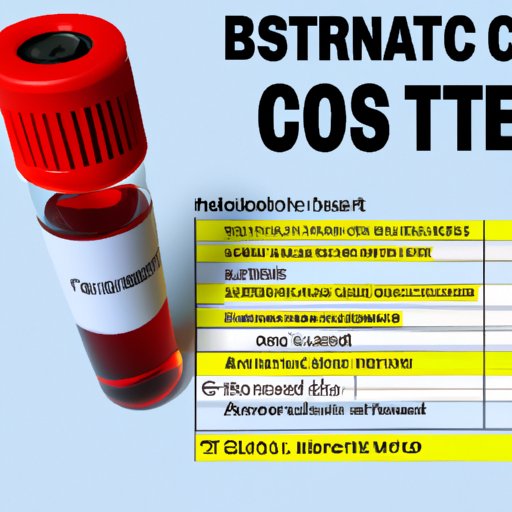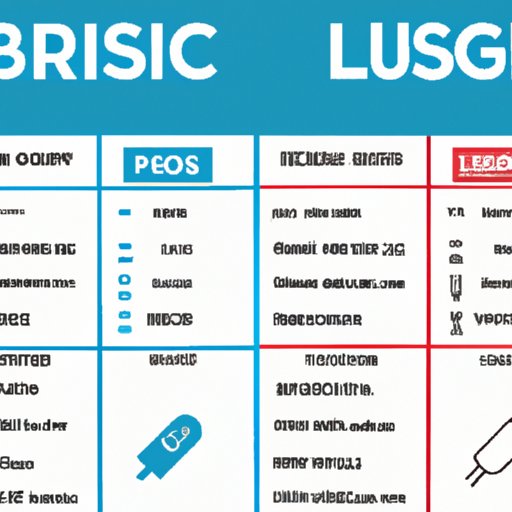Introduction
Blood tests are an important tool used by medical professionals to diagnose and treat various conditions. From monitoring cholesterol levels to checking for signs of infection, blood tests provide valuable insight into a person’s health. But before you can get the results of a blood test, you have to pay for it — and that raises the question: How much does a blood test cost?
This article will provide a comprehensive guide to blood tests and their costs. We’ll discuss the factors influencing cost, the average cost of common blood tests, and how insurance companies determine blood test costs. By the end, you should have a better understanding of what you’ll be expected to pay for a blood test.

A Comprehensive Guide to Blood Test Costs
When it comes to blood tests, there is no one-size-fits-all answer to the question of cost. The amount you’ll be charged for a blood test depends on a variety of factors, including the type of test being performed, the location where the test is being done, and your insurance coverage.
Breaking Down the Prices
The price of a blood test can vary significantly depending on the type of test being performed and the lab or facility performing the test. According to a report from the Kaiser Family Foundation, “the cost of a single laboratory test can range from less than $10 for a complete blood count (CBC) to more than $1,000 for some genetic tests.”
The cost of a blood test also depends on where it’s being performed. The same report found that “the same test can cost three to four times more when conducted in a hospital outpatient setting compared to an independent laboratory.” In addition, if you’re having your blood test done at a doctor’s office, you may be charged a fee for the visit in addition to the cost of the test.
Factors Influencing Cost
In addition to the type of test and location, other factors can influence the cost of a blood test. For example, if the test requires specialized equipment or personnel, it may be more expensive. Additionally, if multiple tests are being performed at the same time, the overall cost may be higher due to the need for additional supplies.
The cost of a blood test can also vary depending on the patient’s insurance coverage. Insurance companies typically charge different rates for different types of tests, and may even require pre-authorization for certain tests. It’s important to understand your insurance coverage so that you know what to expect when it comes to the cost of a blood test.

The Average Blood Test Cost: What You Need to Know
Now that we’ve discussed the factors that can influence the cost of a blood test, let’s take a look at the average cost of some of the most common tests. According to a survey conducted by Healthline, the average cost of the following tests ranges from $30 to $400:
- Complete Blood Count (CBC): $30-$50
- Lipid Panel: $50-$80
- Thyroid Stimulating Hormone (TSH): $50-$100
- Comprehensive Metabolic Panel (CMP): $100-$200
- Vitamin D Test: $100-$200
- Human Immunodeficiency Virus (HIV) Test: $150-$300
- Hepatitis C Antibody Test: $200-$400
It’s important to note that these prices are averages and may not reflect the actual cost of a blood test in your area. Additionally, the cost of a test may be higher or lower depending on the specific lab or facility where the test is being performed.
Blood Test Costs: Understanding Your Bill and Insurance Coverage
If you’re having a blood test done, it’s important to understand your bill and insurance coverage. Insurance companies typically cover some or all of the cost of a blood test, but they may require pre-authorization for certain tests. Additionally, different insurance plans may cover different tests and charge different rates for the same tests.
In order to determine the cost of a blood test, insurance companies look at several factors, including the type of test being performed, the provider ordering the test, and the patient’s medical history. They also consider the cost of the test in relation to the patient’s overall health care needs. Depending on the insurer, the cost of a blood test may be covered in full or partially by the patient’s insurance plan.
Conclusion
Blood tests are an important tool used by medical professionals to diagnose and treat various conditions. But before you can get the results of a blood test, you have to pay for it — and that raises the question: How much does a blood test cost?
This article has provided a comprehensive guide to blood tests and their costs. We discussed the factors influencing cost, the average cost of common blood tests, and how insurance companies determine blood test costs. By understanding the factors that can affect the cost of a blood test, you’ll be better informed and better prepared to make decisions about your health care.
Here are some tips for saving money on blood tests:
- Shop around for the best prices.
- Check with your insurance company to see if they cover any or all of the cost.
- Ask your doctor if there are any discounts available.
For more information on blood tests and their costs, visit the websites of the Centers for Disease Control and Prevention and the American Society for Clinical Laboratory Science.
(Note: Is this article not meeting your expectations? Do you have knowledge or insights to share? Unlock new opportunities and expand your reach by joining our authors team. Click Registration to join us and share your expertise with our readers.)
